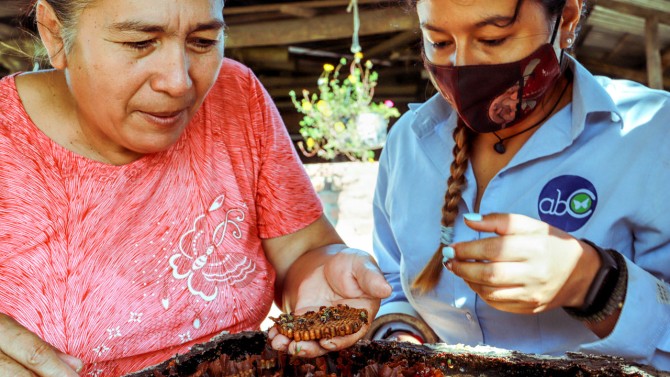
Local beekeepers and researchers examine an open log with a Melipona favosa nest during a workshop led by ABC Colombia on how to transfer colonies to artificial hives to facilitate management and honey harvest.
Beekeeping, hydropower: Cornell Atkinson awards nearly $1M in grants
By Krisy Gashler
For centuries, native farmers in the Neotropics have gathered honey from Melipona bees, a genus of stingless bees that build their homes in hollowed logs. However, as large-scale cattle ranching and rice monoculture farms grow, and climate change disrupts precipitation patterns, bee populations are falling.
Katja Poveda, associate professor of entomology in the College of Agriculture and Life Sciences (CALS), is working with a team led by Colombian women who will study whether nutritional supplementation of Melipona favosa bee colonies could help stabilize populations and honey production, and support the small-scale subsistence farmers who rely on Melipona honey.
Poveda’s project is one of six funded by Cornell Atkinson’s annual Academic Venture Fund (AVF). The center will provide $907,765 in seed funding to support research teams across five colleges and 11 departments, many with external partnerships that strengthen research and speed pathways from innovation to impact.
Poveda, for example, is collaborating with ABC Colombia, a non-profit organization focused on research, conservation and governance in the Orinoquia region of Colombia. Beatriz Ramirez, research director of ABC Colombia, and Laura Figueroa, Ph.D. ’20, assistant professor at the University of Massachusetts Amherst, are collaborators.
“From the work of our collaborators at ABC Colombia we have learned that Melipona honey provides a substantial source of earnings for low-income campesino families and promotes the conservation of the local ecosystem, as bees pollinate and draw nectar from many native plant species,” Poveda said. “The honey produced is commercialized locally at prices ten times higher than honey bee honey, and it is used as a home remedy for respiratory illnesses and eye infections by a population that is very isolated from medical services.”
David Lodge, the Francis J. DiSalvo Director of Cornell Atkinson, said Academic Venture Fund awards are meant to support new, novel or risky research ideas that need early data and partnership building. Many AVF-funded researchers go on to secure larger external grants.
“Academic institutions excel at imagining innovative new ideas, but we need partnerships with community organizations, governments and businesses to translate research to practice,” Lodge said. “The Academic Venture Fund supports research, and importantly, it builds connections between our research community and external partners in support of global sustainability.”
The other five projects awarded AVF grants this year are:
Rethinking hydropower to satisfy energy, climate, and biodiversity goals: Researchers are: Alex Flecker, professor of ecology and evolutionary biology in CALS; Carla Gomes, the Ronald C. and Antonia V. Nielsen Professor of Computing and Information Science in the Cornell Ann S. Bowers College of Computing and Information Science; Stefano Galelli, associate professor of civil and environmental engineering in Cornell Engineering; and Peter McIntyre, associate professor in the departments of Natural Resources and the Environment and Ecology and Evolutionary Biology in CALS.
Seaweed for climate mitigation: Removing barriers to scaling up in Southeast Asia by improving macroalgae quantity and quality: Researchers are: Jenny Goldstein, assistant professor of global development in CALS; and Ian Hewson, professor of microbiology in CALS.
Can the prevention of diseases in cattle reduce their footprint?: Researchers are: Francisco Leal Yepes, assistant professor of population medicine and diagnostic sciences in the College of Veterinary Medicine; Leslie Verteramo Chiu, research associate in CALS’ Department of Global Development; and Joseph McFadden, associate professor of animal science in CALS.
Adaptive agricultural landscapes in the High Atlas Mountains of Morocco: Researchers are: Andrew McDonald, associate professor in CALS’ School of Integrative Plant Science, Soil and Crop Sciences Section; Kurt Waldman, assistant professor of global development in CALS; Alison Power, professor of ecology and evolutionary biology in the College of Arts and Sciences.
Integrating Primary Pandemic Prevention into mainstream policy, funding, and practice through One Health spillover investigation: Researchers are all part of the Department of Public and Ecosystem Health in the College of Veterinary Medicine: Raina Plowright, the Rudolf J. and Katharine L. Steffen Professor of Veterinary Medicine; Amandine Gamble, assistant professor; Ana Bento, assistant professor; Charley Willison, assistant professor; and Krysten Schuler, assistant research professor.
Descriptions of all AVF-funded projects are available on the Cornell Atkinson website.
Krisy Gashler is a freelance writer for Cornell Atkinson.
Media Contact
Get Cornell news delivered right to your inbox.
Subscribe


